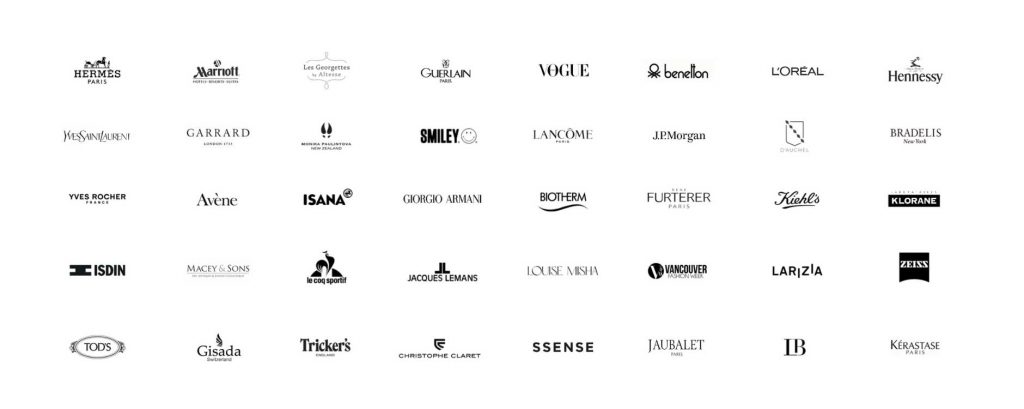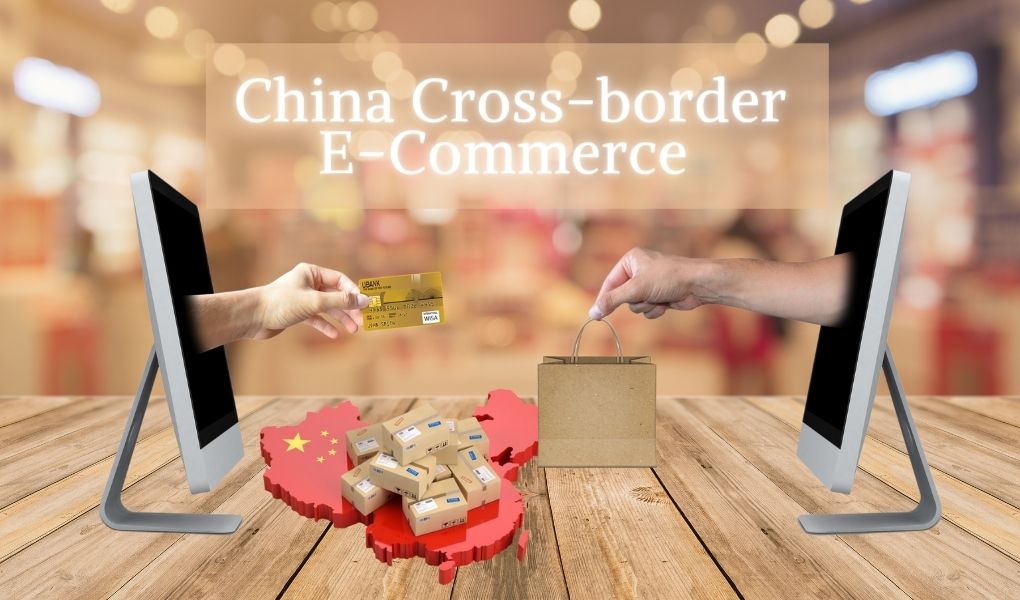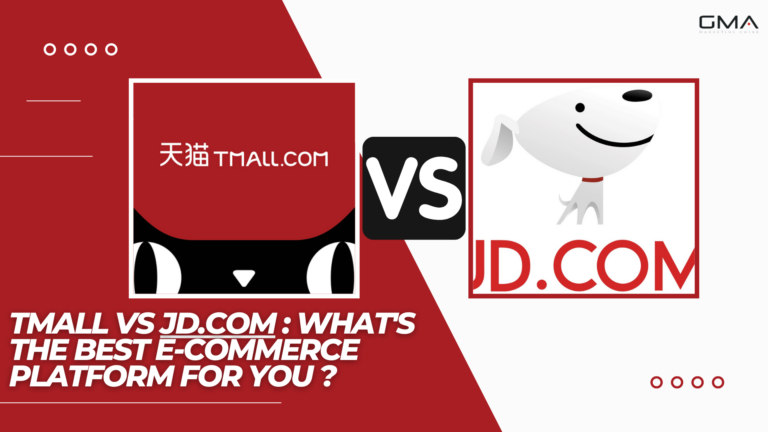The China Cross-border ECommerce market hit US$306.3 billion) in 2022.
Need a cost effective TP (Tmall Partner) to sell in China?
We are an Official Tmall Partner e-commerce Agency. Our Services: E-Commerce, Search Engine Optimization, Advertising, Weibo, WeChat, WeChat Store & PR.
At a press conference on Monday, an official from the General Administration of Customs of China highlighted that China’s cross-border e-commerce has emerged as a significant driver of the nation’s foreign trade growth. The volume of cross-border e-commerce has seen remarkable growth, doubling from 1 trillion yuan in 2018 to 2.11 trillion yuan (US$306.3 billion) in 2022
With a population of almost 1.4 billion people, China’s rapidly rising wages have contributed to a growth in consumption and an increasing purchasing power. The development of various new technologies-related industries, and China’s digitalization greatly contributed to the success of the most lucrative industry in China: E-commerce.
10 data points about cross-border e-commerce:
- Market Size: The global cross-border e-commerce market was valued at over $303 billion in 2022, and it is expected to continue growing.
- Growth Rate: Cross-border e-commerce is growing at a rate of approximately 18% annually, indicating its increasing popularity.
- China’s Dominance: China is a major player in cross-border e-commerce, with Chinese consumers making up a significant portion of global cross-border online shoppers.
- Popular Categories: The most popular cross-border e-commerce product categories include electronics, fashion, beauty products, and health supplements.
- Cross-border Shoppers: As of 2020, about 57% of online shoppers have made a cross-border purchase, demonstrating the global appeal of such transactions.
- Payment Preferences: Credit cards and digital payment methods like PayPal are commonly used for cross-border e-commerce transactions.
- Shipping : Cross-border e-commerce often involves longer shipping times compared to domestic purchases, with delivery times varying widely depending on the destination.
- Return Challenges: Returning items in cross-border e-commerce can be more complicated due to shipping costs and international regulations.
- Import Duties and Taxes: Shoppers often need to pay import duties and taxes on cross-border purchases, which can affect the overall cost.
- Marketplaces: Popular cross-border e-commerce platforms include Amazon Global, AliExpress, eBay Global Shipping, and Alibaba’s Tmall Global, which facilitate international transactions for both consumers and businesses.
However, it is important to understand how e-commerce works for foreign companies. One of the best ways for foreign companies outside of China is to sell products via a cross-border e-commerce website. But, with its plethora of platforms, it can be difficult to choose the one that will fit your needs. So, whether you have a small business or a large-scale company that is interested in doing cross-border e-commerce (CBEC) in China, this article will go through the basics of doing cross-border e-commerce in China.
2024 new regulations
it’s essential to verify the most recent developments and changes in regulations since they may have evolved since then. Here are five potential regulations:
- Enhanced Product Quality and Safety Standards: Chinese authorities have been working on strengthening regulations related to product quality and safety for cross-border e-commerce. This may include stricter testing and certification requirements for imported products to ensure they meet Chinese standards.
- Increased Taxation and Tariffs: China has been adjusting its tax policies for cross-border e-commerce to create a more level playing field for domestic and international businesses. There have been changes to tax rates and import duties for cross-border transactions.
- Registration and Licensing Requirements: To regulate the cross-border e-commerce industry further, China may introduce registration and licensing requirements for overseas e-commerce platforms and businesses selling to Chinese consumers.
- Data Security and Privacy Regulations: As data security and privacy concerns continue to rise globally, China may implement stricter regulations regarding the collection, storage, and handling of personal data by cross-border e-commerce platforms.
- Anti-counterfeiting Measures: China has been actively combating the sale of counterfeit and infringing products in cross-border e-commerce. Stricter penalties and enforcement measures may be introduced to deter such activities.
Cross-border e-commerce in China: overview
In recent years, being on e-commerce platforms has become a must-have for both Chinese and foreign companies that are ready to invest a lot of money in order to be on the most popular e-commerce platforms such as Tmall or JD.com. In fact, the majority of the Chinese population regularly purchases products online, as it is easier and more convenient.
However, you should take into account that in order to sell your goods on Chinese e-commerce platforms, you will need to have a Chinese entity / be established in China, with legal Chinese documents, etc (for the majority of them). For foreign companies that do not have a Chinese entity, the best way to sell your goods in China is to register for the international version of these websites.
As its name indicates, cross-border e-commerce allows you to directly send your foreign products to China. Chinese consumers can buy those foreign products on specialized cross-border platforms, which we are going to present later in this article.
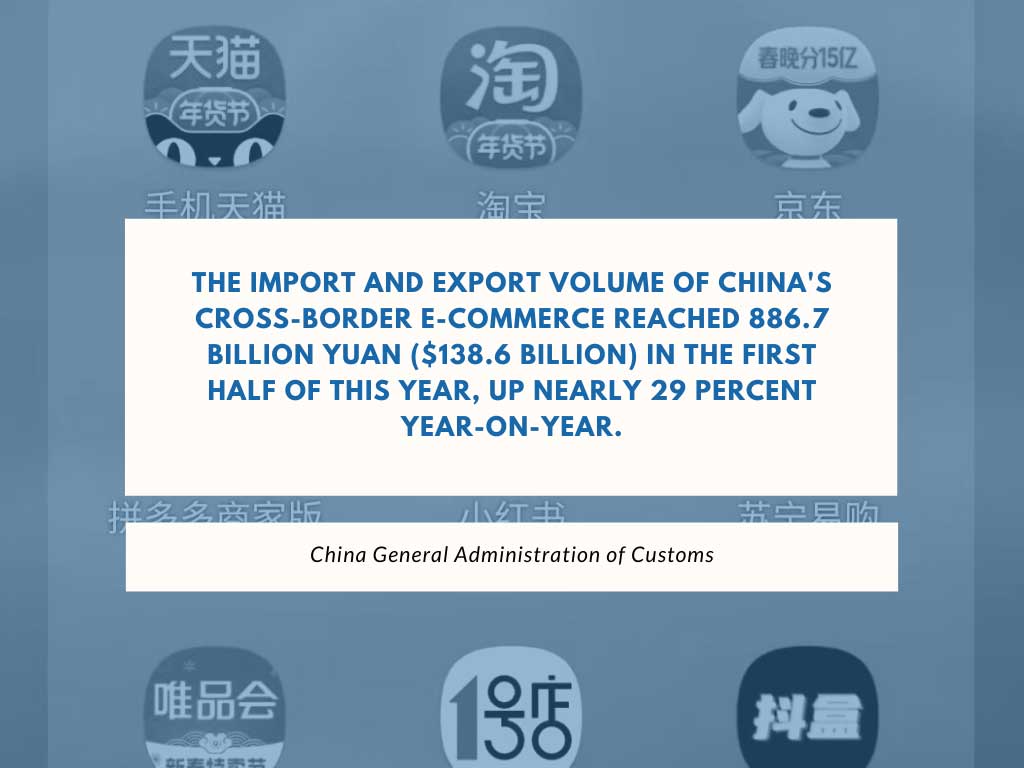
What drives cross-border eCommerce in China
Over the years, the Chinese government’s support for the cross-border e-commerce industry has remained strong, and policies are likely to be further relaxed when it comes to Chinese foreign trade. China is expanding the cross-border e-commerce system because it is more regulated and taxed. The Chinese Government is indeed trying to make it easier to protect Chinese consumers from fake goods and unstandardized cross-border purchases.
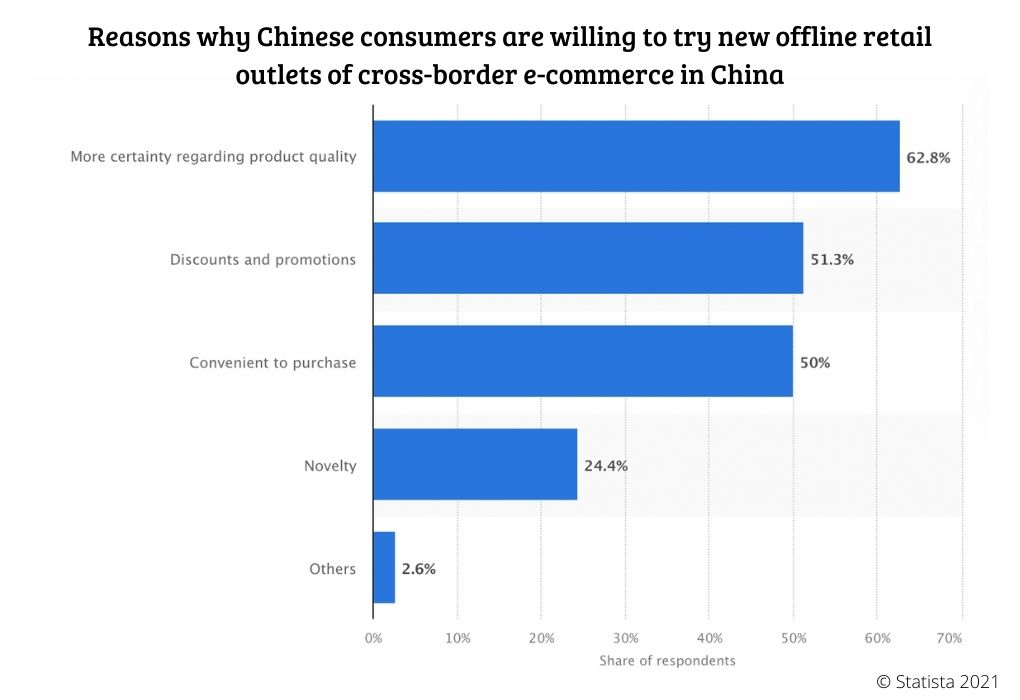
We remain positive on the outlook for the industry, and 2023 will be a year in which many new opportunities will arise, as the economy will soar again in China, after the Covid-19 outbreak that has greatly contributed to the rising use of e-commerce platforms.
International brands and retailers who remain flexible and open-minded will certainly be able to succeed in this very competitive yet lucrative market, establishing a well-prosperous Chinese cross-border business.
Cross-border products are at the core of Chinese consumers’ habits
It’s clear that the cross-border e-commerce industry in China is becoming more and more complex, with brands and retailers that have to choose the appropriate market entry model, but entering the Chinese market via cross-border platforms is still extremely rewarding.
In the past, Chinese consumers were flocking to the same well-known brands that everyone else was buying. Nowadays, tier 1-2 cities are joined by third-tier cities that will continue to spend more for higher-quality imported products, specifically those for the health, fashion, and beauty industries. Moreover, with the daily use of Alipay and WeChat Pay, Chinese consumers tend to be more easily spending money online.
WePay and Alipay: the two most popular payment services in China
Before starting your business on WeChat, you have to know that Chinese consumers are used to paying with their smartphones in their daily lives, from hailing a cab to booking a medical appointment. When selling on the internet to them, they will certainly use one of the most popular payment services in China: WePay and Alipay.
Fluctuating exchange rates can lead to a significant impact on the company. To facilitate these transactions, you can use cross-border payment versions from WeChat or Alipay. Both methods require a business license but no need for a Chinese bank account.
To understand the differences between WePay (WeChat / Tencent) and Alipay (Alibaba) for cross-border companies, here are the characteristics of each of the two platforms:

Of course, do not hesitate to contact us if you have questions or if you want more information about WePay and Alipay.
The top 5 cross-border e-commerce platforms in China
Actually, there are more than a dozen different cross-border e-commerce platforms in China such as Jumei Global Store, Daling, Amazon Global, B&G, Kaola.com, Suning Global, JD Worldwide, Tmall Global, VIP International, etc. that are covering every products’ category.
However, the market is still dominated by the biggest domestic e-commerce players, Alibaba’s Tmall Global, and JD Worldwide, even though smaller competitors are now ramping up in China in terms of cross-border sales.

Choosing the right cross-border platform can determine your success in China, and that’s why we are now going to give a short presentation of the 5 most popular cross-border e-commerce platforms in China, for foreign companies.
Tmall Global: China’s most popular cross-border eCommerce platform
Launched in 2014 by the giant Alibaba Group, Tmall Global (天猫国际) is the international version of China’s leading online marketplace: Tmall. Known as the most famous and largest cross-border B2C platform, Tmall Global (aka Tmall.hk) offers both wholesale (B2B) and retail (B2C) models for international merchants and has evolved to be a trusted platform to purchase imported products.
To understand Tmall’s popularity, we can see that there are more than 20,000 international brands that are registered on the platform, in more than 77 countries. The platform also has a large variety of products, with more than 4000 categories. Tmall Global has been the 6th moth used online store in China, and 65% of cross-border online shoppers use its app on their smartphones. It is also important to know that 78% of Tmall Global customers also use Tmall.com.
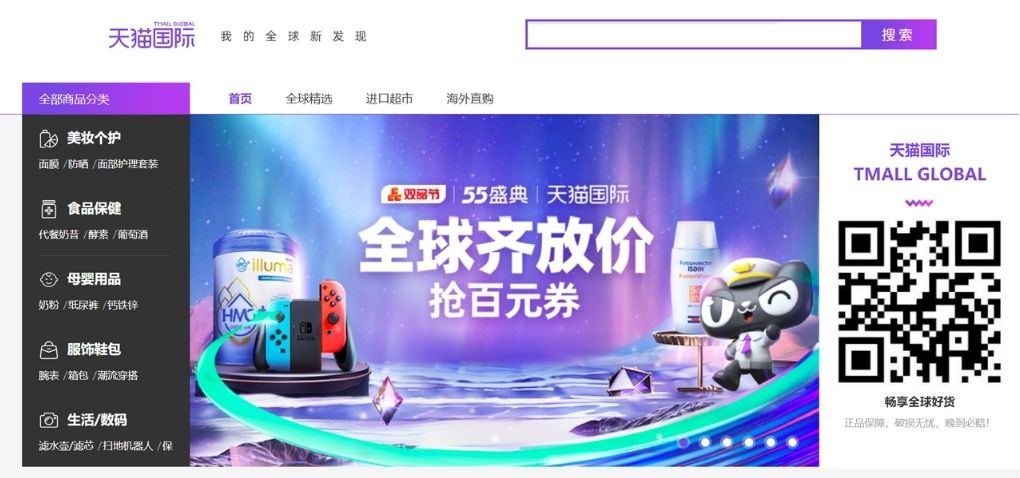
Over the years, Tmall was able to grab the majority of China’s e-commerce market shares, establishing itself as the most popular Chinese e-commerce website and becoming the best online gateway for local and international retailers.
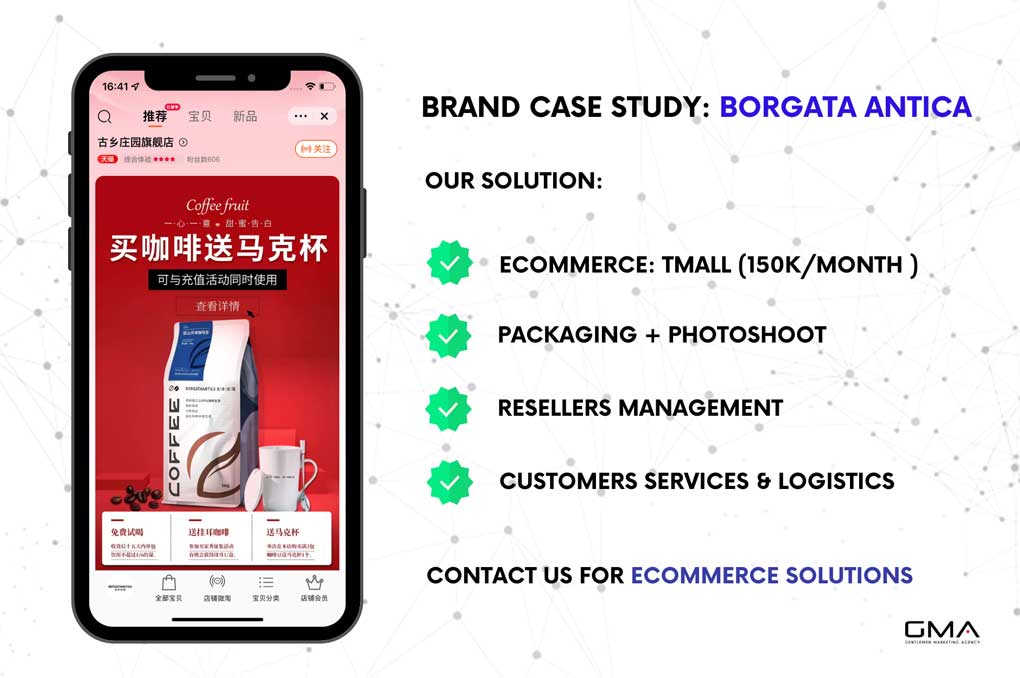
You have to know that Chinese consumers are extremely cautious when it comes to purchasing products. Thus, they tend to think that foreign products have a better quality than some Chinese products for example. By selling your goods on China’s cross-border eCommerce platform, you will be able to reach a wide audience as well as increase your visibility.
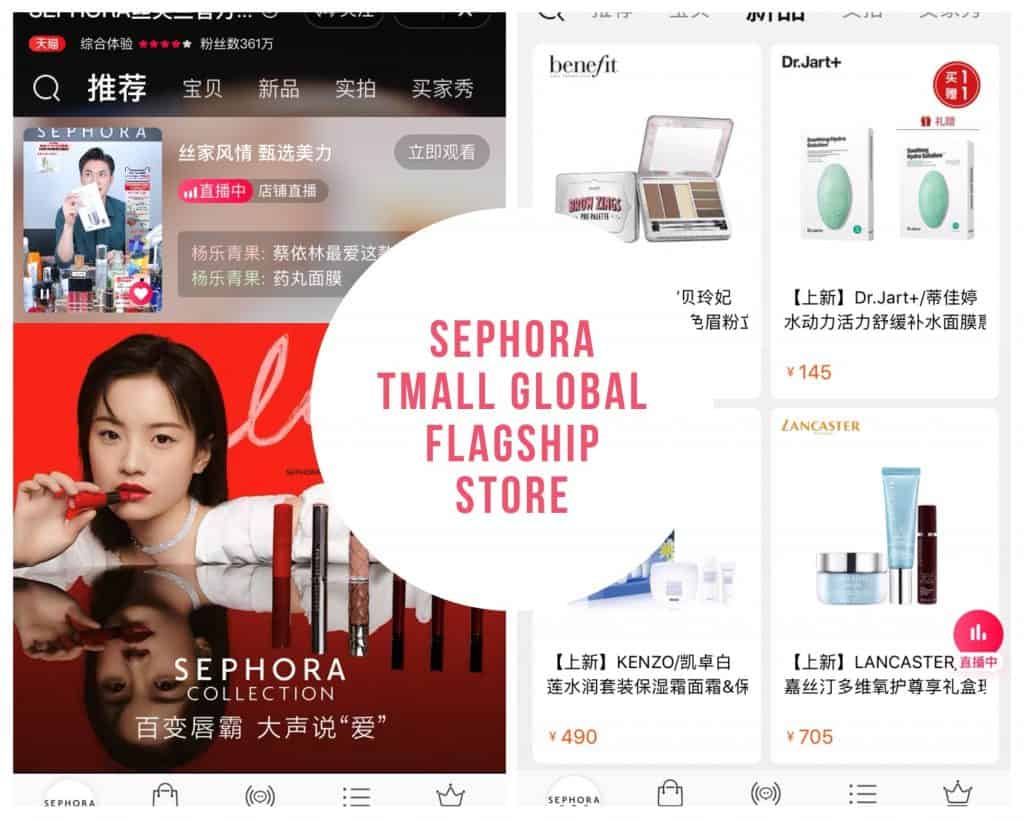
Douyin Crossborder: the Game Changer 2024
Douyin Crossborder is a cross-border e-commerce feature integrated into the popular Chinese short-video app, Douyin, known as TikTok outside of China. It allows international businesses to leverage the platform to reach Chinese consumers and sell products directly to them. This feature enables brands and merchants to tap into the massive and engaged user base of Douyin for cross-border trade.
Five Key Facts about Douyin Crossborder:
- In-App Shopping Experience: Douyin Crossborder provides users with a seamless shopping experience directly within the app. Users can discover products through short videos, explore product details, and make purchases without leaving the platform.
- Popular Products: Cross-border e-commerce on Douyin primarily focuses on fashion, beauty, and lifestyle products, catering to the preferences of the platform’s predominantly young user base.
- Live Streaming Sales: Live streaming is a significant component of Douyin Crossborder. Influencers and brands often host live-streamed shopping events, showcasing products and interacting with viewers in real-time to drive sales.
- Payment Integration: Douyin integrates with popular Chinese digital payment methods such as Alipay and WeChat Pay, making it convenient for users to make purchases.
- User Engagement: With over 600 million active users in China, Douyin offers a vast audience for cross-border sellers. Users engage with short videos, swipe through product catalogs, and participate in interactive shopping experiences.
JD Worldwide: a high-end eCommerce platform
Founded in 1998 by Liu Qiangdong in Beijing, JD (which stands for Jingdong 京东) was at the beginning only a magneto-optical store, which diversified over the years with electronics, computers, mobile phones, etc. In 2004, it opened its online retail platform and quickly became one of the two massive B2C online retailers in China with its competitor the Alibaba-run Tmall. Now, JD.com is partly owned by the giant Tencent, which has 20% of its stake. As of 2023, JD.com has over 470 million active customers.
JD.com has set its standards for online shopping through its commitment to quality, authenticity, and the variety of products it offers, covering everything from fresh food and apparel to electronics and cosmetics. Another asset of JD.com is the delivery time, which is, in general, the same day (or less than 24 hours).

Unlike its domestic version JD.com, JD Worldwide (jd.hk) enables any international e-commerce business from around the world to sell their products directly through China cross-border eCommerce. Thus, even those that do not have physical stores in China can get to sell their products on the platform.
JD Worldwide provides global shipping and warehousing solutions that ensure products from countries around the world are delivered to the doorsteps of Chinese customers at ease. It means that you will be able to send your products via DHL, Australia Post, etc.
Kaola: the success story of a newly arrived platform
Launched in 2015 by Nasdaq-listed NetEase – one of China’s leading Internet and online game service providers, Kaola.com is China’s second-largest cross-border import retail e-commerce platform selling ‘Western’ brands.
Kaola is a platform that provides online services focused on selling high-quality foreign products to middle-class Chinese consumers with an emphasis on the sale of large-scale products directly to buyers. The app is more popular with white-collar citizens aged 20-40 products categories and has been growing in the last few years.
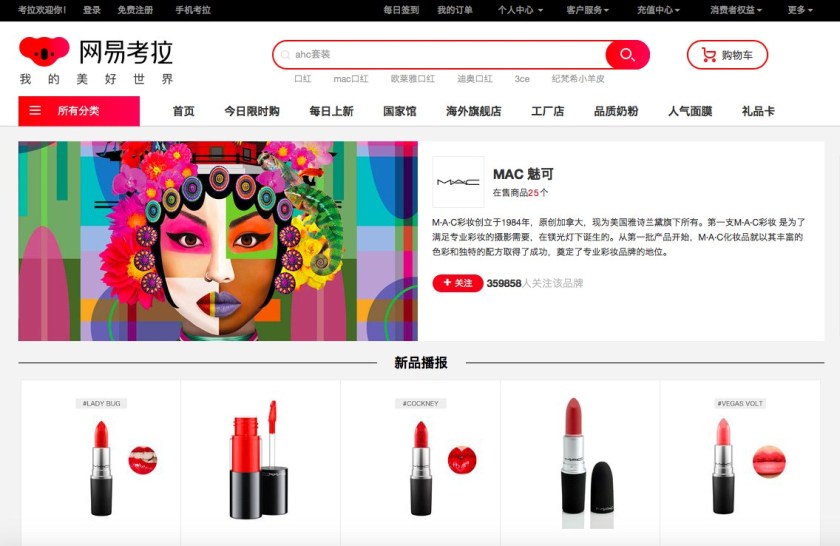
Even though Kaola is still considered a young player in the e-commerce industry compared to giants like Tmall or JD, Kaola was able to become China’s leading cross-border e-commerce platform with a market share of more than 27.1%, until it was topped by Tmall Global at the beginning of 2020.
Like any other cross-border e-commerce platform, Kaola lets sellers showcase their products across many online forums, portals, and marketing channels. Kaola provides a platform for international brands to sell their products securely to Chinese consumers, and for Chinese consumers to purchase safe, high-quality, and international premium goods in a convenient way.
VIP international
Founded in 2008 and based in Guangzhou, VIP Shop (唯品会 Wei Pin Hui) is the third-largest e-commerce company specializing in online discount sales. Following its huge success, it was even listed on New York Stock Exchange (NYSE) in 2012.
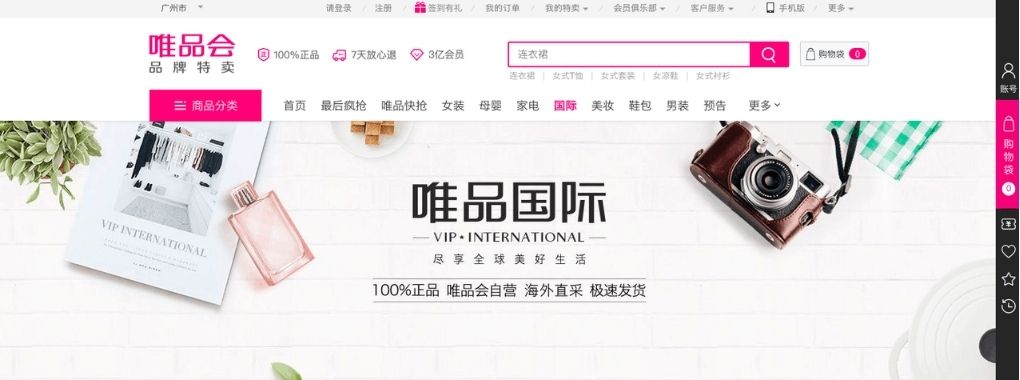
In 2014, it introduced its global version VIP International, a cross-border section of VIP Shop, taking up 10% of the cross-border e-commerce market. On VIP International, all products are sourced and bought directly from overseas, while Chinese products are sold on VIP.com.
Some characteristics of VIP International
- It has set up professional buyer groups in 11 countries and regions to guarantee the products’ authenticity.
- It has also formed close relations with several consulates and long-term partnerships with well-known brands across the world.
- In-house 24/7 customer service
- Consumers can return goods within 7 days without any explanation. The process will be treated in China, so it means that they will quickly receive their refund.
- Based on its 12 warehouses overseas and 11 bonded warehouses in China, VIP International has built a sophisticated and flexible logistics network, which enables it to start delivery within 12 hours after orders are received.
Known for its variety of reputable international brands, VIP International is among the most popular e-commerce platforms in China, especially among the younger generation. Its main competitors are Tmall Global, JD Worldwide, and Kaola.
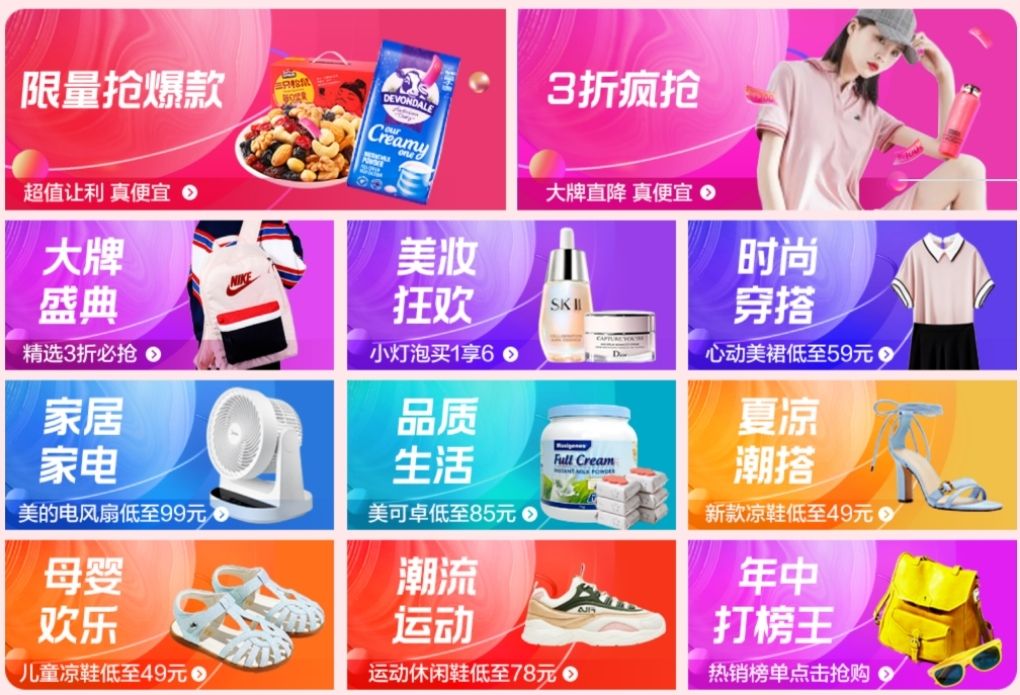
VIP Shop is specialized in selling high-end fashion, cosmetic & beauty products, as well as home items at a discounted price.
VIP International uses direct overseas procurement and has its own delivery partners in Mainland China which allow the company to reduce some costs and provide qualitative and low-cost services to customers.

VIP International’s strategy is to team up with popular and well-known brands by selling their excess inventory at discount prices. The app has established a great position in China’s online market and discount retail market. Some of its most popular categories are Cosmetics & Beauty, Maternity & Baby, Food & Nutrition, Home & Personal Care, Fashion & Apparel.
Xiaohongshu (Little Red Book)
Founded in 2013 by Charlwin Mao and Miranda Qu, Xiaohongshu (小红书) also known as ‘The Little Red Book’ and ‘RED’, is a social media and one of the world’s largest community e-commerce platforms. Over the years, it has grown to become China’s foremost shopping platform in terms of beauty, fashion, and luxury products.

Being one of the largest and fastest-growing social e-commerce apps in China, its online sharing community enables users to post their recommendations based on their previous experiences. From that feature, it naturally added cross-border sales features as well.
Unlike other social media, the platform aims to offer more informative and detailed content in order to make it more authentic and build trust with Chinese users. In the past, RED was mainly focused on beauty and cosmetics, however, it has been expanding to other segments such as fashion, food, traveling, and lifestyle.

Bonus: Cross-border WeChat mini-programs (out of date in 2024)
Chinese consumers have become increasingly drawn to foreign brands via e-commerce platforms. For small brands, WeChat stores are a cost-effective way to build an e-commerce presence in China without paying large upfront fees for e-commerce platforms such as Tmall or JD.com. For big brands, they can be used for different functions such as launching limited collections, live-streaming makeup tutorials, or designing creative games.
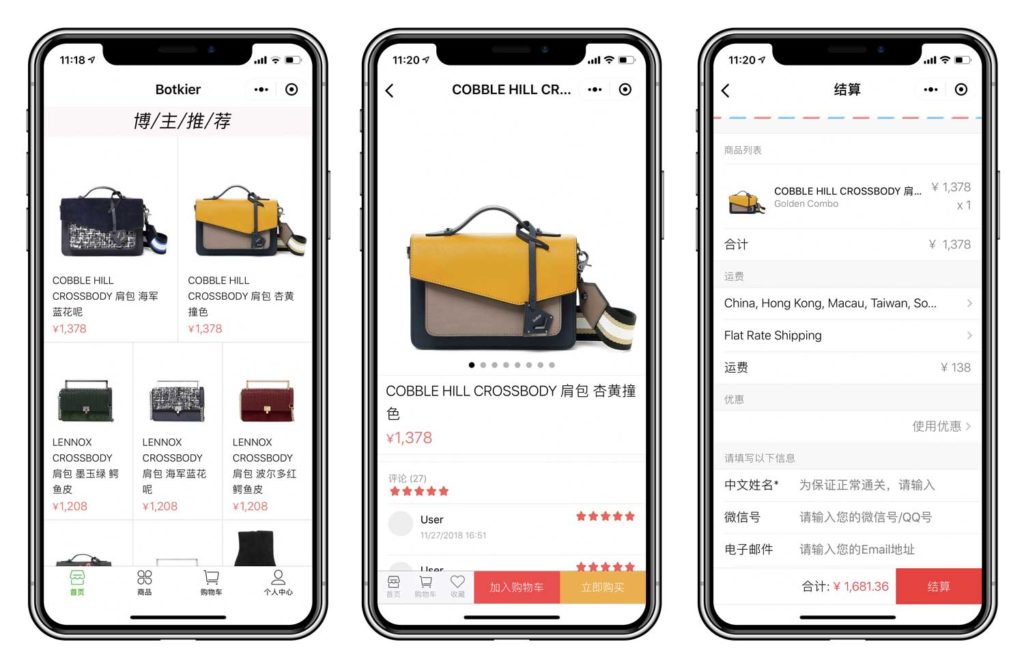
What is the process for exporting products to China?
To begin with, if you want to sell your cross-border products in China, it is essential to understand the benefits, pros, and cons of each cross-border e-commerce platform in China.
To export your products in China, there are 3 main methods:
- Universal Postal Union (UPU): It is an informal technique that allows you to send small parcels to China. It doesn’t require an import permit, but products may be subject to a tax of up to 15/30/60% according to the category of product. The total product value must not exceed 1000 RMB for 6 products and needs to be checked concerning the restrictions and prohibitions terms of import in China (cf. FedEx website).
- Import through B2C: A formal export model in which the package is declared via a platform to alert customs of its shipment. A good way to ship products such as food, cosmetics, and high-end consumer products.
- In-bond import model: This method is a bit more complicated as it requires to have the necessary storage to stock your products in a strategic area such as Hong Kong or other special areas for CBEC. This type of shipment applies to products such as consumer goods, low-value goods, or heavy goods vehicles.

Cross-border e-commerce retail & imports regulations
Keep in mind: For the last two methods, shipments are subject to import tax payments, VAT, and consumption tax (product tax is about 11.2% for the largest category of products or 25.5% for high-end cosmetics, luxury care, and perfume).
Bonus: you can also ship your products to Mainland China’s bordering countries (Hong Kong for example) where they will be stored before being fulfilled to the customer. The good part is that if nobody in China purchases it, you can still sell it through other channels in Asian countries.
Since 2016, a “positive” product list has been approved, resulting in a preferential import tax of 11.9% tax rate for certain goods. Those goods are also exempt from the additional time at custom clearance and don’t require an import license or other certificates.
For customer clearance, you can either deal with it by yourself or hire a logistic company to help you deal with the multiple steps during the procedure which includes:
- Customs registration
- Declaration and inspection of imported products
- Payment of taxes and exchange control
- Customs clearance
A certificate of quarantine from the local inspection & quarantine authority will still be required for alcoholic beverages, cosmetics, seeds, foodstuffs, and plants.
How much will I pay to sell my products via cross-border platforms?
Depending on the type of activities you operate in, the fees may vary from one company to another. We cannot give an exact price investment you’ll need, but you can contact us to talk about it, and we will help you with it. To give an idea of the main fees, here are the most important factors to take into account when selling cross-border products to China.
- Creation and maintenance of internet platforms (fee-related to the platform: Tmall / Taobao / Kaola, etc.),
- Design, update, and optimization (designer fees),
- Generating traffic (the more competitors, the more expensive it is),
- Warehouse management system,
- Enterprise Resource Planning,
- Transportation management system,
- Shipping costs,
- Advertising and marketing campaign (WeChat, Weibo, XiaoHongShu, etc.),
Budgeting your project will be very important to import products in China. Do not hesitate to contact us for more information.
Contact us to get started on cross-border platforms in China
It is clear that China has become the market to conquer for brands that want to expand their activities worldwide. However, the Chinese market is completely different from what you might be accustomed to.
As a foreign company entering the Chinese market, it is important to get to know the different cross-border platforms to choose the one which will suit you the best. To do so, you will need experts who fully understand the subtleties of China and can help you take advantage of these platforms to sell your products to Chinese consumers.

Why should you work with us?
GMA is a digital marketing agency based in Shanghai, with experts from all around the world. Depending on your needs and the scope of work, we will adapt our marketing strategy in order for you to get the most out of e-commerce in China. As of 2023, we have worked with more than 800 Western brands.
- We can do an audit of your brand
- We can imagine the right marketing strategy to level up your brand
- We can also send our Case studies in order for you to see the projects we have already dealt with
- You can speak to an expert (ask our Expert for Brand Level 3)
SEO experts
Our focus is to promote your business with your target closely in mind. Choosing the right platform(s) to sell your goods in China is the first thing you’ll need in order to enter the Chinese market. We will then use digital tools including social media (WeChat, Weibo), Baidu SEO and SEM, E-PR, Media Buying (DSP) & we will take care as well of the Community Management of your social accounts. Finally, we’ll manage the marketing and advertising campaign to guarantee its optimization & success.
Lead generation professionals
To be effective in your lead generation, you need to develop a good e-reputation. Online advertising & quality content will help you to develop your e-reputation.
Experts in Digital Solutions
- Website Creation, Development & Auditing
- Baidu Search Engine Optimization
- Social Media Marketing (WeChat & Weibo)
- Reputation Management & Community Development.
- Public Relations & Exposure in Chinese E-Media.
- Analytics, monthly reports & analysis from our team of experts.
ROI focused agency
We are an ROI-focused agency. The solution is to attract and also re-target the most qualified traffic in order to increase conversion rates, which can be effective for E-Commerce in China.
